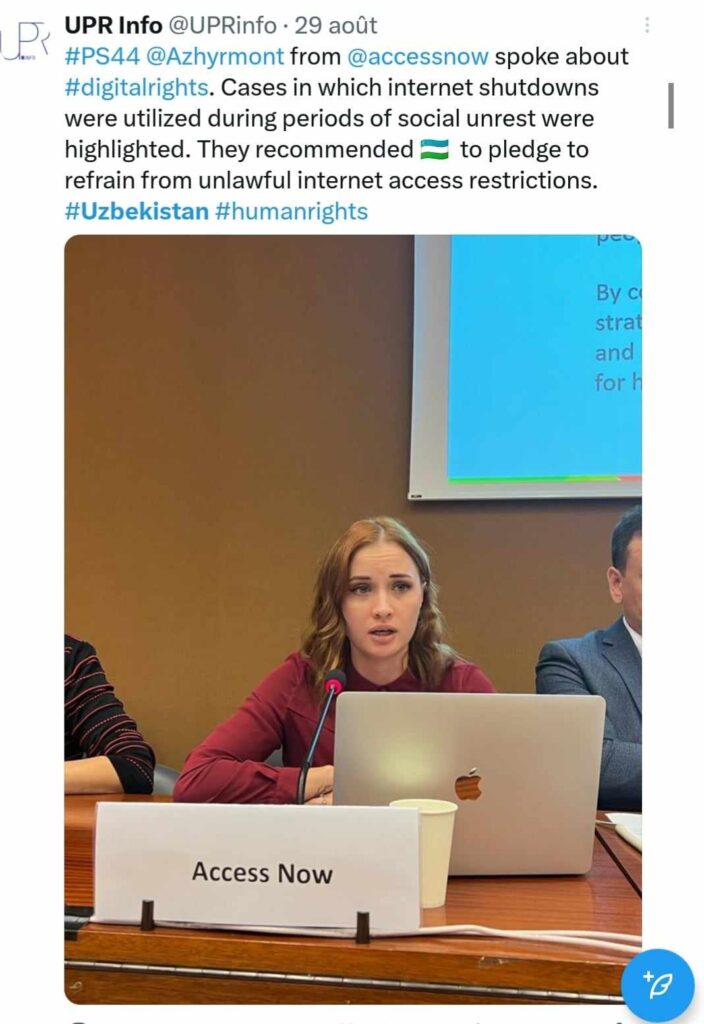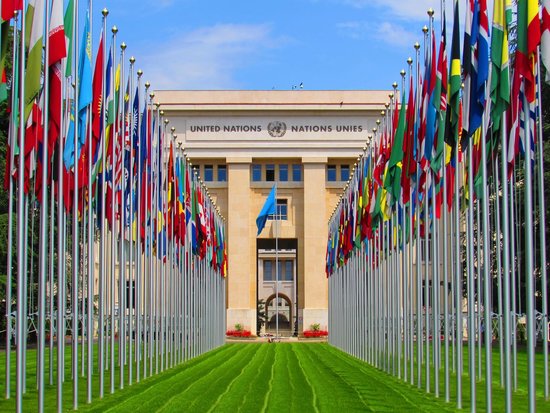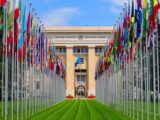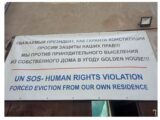UPR pre-session on Uzbekistan: Digital rights at risk
21.09.2023
Access Now is an international organisation that works to defend and extend the digital rights of individuals and communities at risk around the world.

By combining direct technical support, comprehensive policy engagement, global advocacy, grassroots grantmaking, legal interventions, and convenings such as RightsCon, we fight for human rights in the digital age.
During the third UPR cycle, Uzbekistan received approximately 212 recommendations,[1] supporting 198 and noting 14.[2] Two of recommendations addressed digital rights specifically.
Despite accepting both of them, recent changes in Uzbekistanʼs legislation on informatisation and on data protection authorize the government to block internet services and limit the flow of information. In March 2021, the Law on Informatisation was amended,[3] putting additional obligations on the owners of online resources, including bloggers, to verify the accuracy of information before posting it online and/or to immediately delete false information published on their websites.
Aggressive and arbitrary timelines (when decision to block is made within 1 working day) introduced by Uzbekistan regulations hinder the ability of owners of online resources to make nuanced and context-specific determinations and make it extremely difficult for the authors to contest the removal of information. Vaguely worded language of Article 121 of the Law of Informatisation[4] lead to the intermediariesʼ overcompliance and self-censorship of the authors.
Furthermore, under the pretext of preventing “data leakage in social networks and other Internet resources”, data localization laws have opened the door to state censorship. TikTok is still restricted on the territory of Uzbekistan,[5] and many more social media have been temporarily blocked through the last 4 years. No official explanation has been provided as to the grounds of excluding previously blocked platforms from the data protection perpetratorsʼ list or to the reasons for putting them there in the first place. Although access to most social media platforms has been restored, on November 1,
2022, the responsibility for non-compliance with the Law “On Personal Data” was further toughened.[6]Social media platforms can face severe fines and even criminal responsibility for violating national localization requirements.
Access Now and the #KeepItOn coalition — a coalition of more than 300 organisations from 105 countries around the world dedicated to fighting internet shutdowns — have also investigated and documented internet shutdowns in Uzbekistan.
In 2022, a er Uzbek President Shavkat Mirziyoyev proposed amendments[7] to the Constitution that would curtail the autonomy of the Karakalpakstan republic, the Uzbek authorities responded with internet shutdowns to the outbreak of social unrest. Internet disruptions lasted almost a month, from June 26, 2022 till July 19, 2022, and le many people in a state of frustration and risk.
When thousands of people gathered in Nukus and other cities of Karakalpakstan to express their discontent with the proposed amendments,[8] the government reacted with a disproportionate shutdown of fixed-line internet, making it difficult for the Karakalpaks to locate their loved ones amidst state violence, or likewise to find the missing journalists who had been documenting the events. The shutdowns also stopped ATMs and payment services from functioning, putting people at an additional risk because they were unable to buy food or medicines.
While Uzbekistan authorities by imposing internet shutdowns, try to hide from international societyʼs scrutiny and responsibility, Uzbekistan itself uses targeted surveillance attacks on civil society,[9] and is named in various investigatory reports as a likely customer of several kinds of spyware companies, including Circles[10] and Candiru.
In 2019, the Canadian non-profit organization eQualitie has uncovered[11] a campaign of phishing attacks targeting independent media and human rights activists. Amnesty International subsequently conducted an investigation into the campaign and discovered that the attackers deployed spyware on Windows and Android operating systems.
We urge that the right to privacy and data protection, the right to freedom of expression, and the right to freedom of peaceful assembly and association, on- and offline, are prominent issues in the upcoming UPR review cycle. We therefore recommend that Uzbekistan:
- Refrain from shutting down the internet and blocking social media and make a state pledge to refrain from imposing any unlawful restrictions on internet access and telecommunication in the future;
- Repeal or otherwise amend laws which provide for overbroad executive powers to infringe upon the right to freedom of expression and access to information — including, but not limited to the Law on Informatisation, Resolution of the Cabinet of Ministers of the Republic of Uzbekistan of September 5, 2018 No. 707 About measures for enhancement of information security on the world information Internet, Law on Personal Data — to bring them in line with Uzbekistanʼs international human rights obligations.
- End mass surveillance programs and enact laws guaranteeing adequate privacy protections.
One minute statement
Even though Uzbekistanʼs laws guarantee freedom of expression and protection of the media on paper, Uzbekistan remains a repressive country in online spaces. The state shuts out independent media and critical voices online through harassment, intimidation, surveillance, blocking of websites and entire social media platforms and messaging services, as well as implementing complete internet shutdowns.
We are pleased to see that access to many social media platforms has been restored, but we are deeply disturbed by growing practices of implementing internet shutdowns to silence dissent voices and engaging in fishing, bot attacks and cyber attacks to prosecute journalists and civil society. We are also disturbed by the fact that social media platforms can face severe fines and even criminal responsibility for violating national localization requirements.
We call on the government to ensure that the internet, including social media and other digital communication platforms, remain open, accessible, and secure across Uzbekistan.
[1] UPR Info, 3RP: Report of the Working Group on the Universal Periodic Review, Uzbekistan, available online: https://documents-dds-ny.un.org/doc/UNDOC/GEN/G18/208/50/PDF/G1820850.pdf?OpenElement, 2018.
[2] UPR Info, 3RP: Views on conclusions and/or recommendations, voluntary commitments and replies presented by the State under review, Uzbekistan, available online: https://documents-dds-ny.un.org/doc/UNDOC/GEN/G18/271/79/PDF/G1827179.pdf?OpenElement, 2018.
[3] Xs.uz, Law On amendments and additions to some legislative acts of the Republic of Uzbekistan, available online:
https://xs.uz/ru/post/o-vnesenii-izmenenij-i-dopolnenij-v-nekotorye-zakonodatelnye-akty-respubliki-uzbekistan-11, 31 March 2021.
[4] Lex.uz, Law on informatisation, available online: https://lex.uz/acts/82956, consulted on 4 April 2023.
[5] Register of violators of the rights of personal data subjects, available online: https://pd.gov.uz/spoiler/?type=spoiler, consulted on 4 April 2023.
[6] Gazeta.uz, Ужесточается наказание за нарушение закона о персональных данных, соцсетям грозят штрафы, available online: https://www.gazeta.uz/ru/2021/11/01/personal-information/, 1 November 2021.
[7] Aljazeera, Protests in Uzbek autonomous region over constitution reform plan, available online:
https://www.aljazeera.com/news/2022/7/2/protests-in-uzbek-autonomous-region-over-constitution-reform-plan, 2 July 2022.
[8] Eurasianet, Uzbekistan: Unrest-stricken region plunged into information blackout, available online: https://eurasianet.org/uzbekistan-unrest-stricken-region-plunged-into-information-blackout, 2 July 2022.
[9] Amnesty International, Targeted Surveillance Attacks in Uzbekistan: An Old Threat with New Techniques, available online:
https://www.amnesty.org/en/latest/research/2020/03/targeted-surveillance-attacks-in-uzbekistan-an-old-threat-with-new-techniques/, 12 March 2020.
[10] ForensicNews, NSO Group Affiliate Circles Sold Equipment to Uzbekistan ʻSecret Policeʼ, available online: https://forensicnews.net/nso-group-affiliate-circles-sold-equipment-to-uzbekistan-secret-police/, 3 September 2021.
[11] eQualitie, Deflect Labs report #6: Phishing and web attacks targeting Uzbek human rights activists and independent media, available online: https://equalit.ie/deflect-labs-report-6/, consulted on 4 April 2023.


